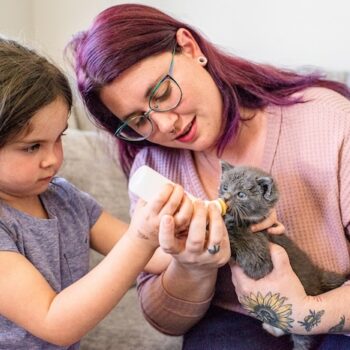It’s kitten season again, and who isn’t on the lookout for more foster caregivers for neonatal kittens? Here are seven tips for finding and keeping them!
Make sure your supporters understand why kittens are in need of foster (i.e., this is a critical time in their development for socialization with humans, and their immune systems haven’t fully developed yet). Market research shows that most people don’t understand how or why fostering is needed, and telling them can motivate them to try.
Target some recruitment efforts to people already familiar with skills neonatal fosters need, like local vet clinic staff and those who work at medical facilities. “When I first started Kitten College, neonatal fosters were our biggest need,” says Marnie Russ, National Kitten College Program Administrator at the Animal Welfare League of Arlington. “I started to build that part of our program by setting up appointments with vet clinics in our area to let them know what we were doing at the shelter. I would always have bottle babies with me when did these meetings and I never left with them. Veterinarians and veterinary technicians rarely see neonates in their clinics and often don’t even learn about them in vet school. They loved dealing with them and it helped us build relationships with these clinics.”
Offer shorter fostering experiences, like they do in the Kitten College program. There, experienced neonatal fosters pass on their kittens to another foster after they’ve been stabilized and monitored for illness. This opens them up to take more bottle babies, or have a well-deserved break. “Categorizing our fosters by “Class” allowed them to choose the age they were most comfortable fostering and allowed us to keep the vital bottle baby fosters available,” says Russ. “There were several things that came out of this that were “happy accidents.” What we learned is that the shortened foster commitment opened us up to a lot more fosters… we also learned that moving healthy kittens through different foster parents during their time with us, made them incredibly adaptable.”
Have a “growth mindset,” offering training so fosters can continually develop their skills. Here are some free resources you can point them toward:
- Taking the fear out of bottle feeding and basic kitten care (MU course)
- Flash classes (short videos for foster caregivers on various foster-related topics)
- You can find lots of neonatal-related templates and resources in the MPF Resource Library
Talk about fostering all the time in your communications to help it become part of your community’s culture. Per market research, a major reason potential fosters decide not to sign up is that they feel general uncertainty about the program. Use communications like your website, volunteer newsletters, literature, social media and even email signatures to familiarize supporters with fostering and let them know how important it is to your organization.
When you create pleas for bottle baby fosters, show the kittens who need foster right now. Showing the actual pets in need of fostering helps potential fosters make emotional connections to them, which can motivate them to act.
Support the fosters you have so they want to come back for more! In the Kitten College, Russ tells us that foster retention is very high. “In part they like the idea of choosing a “specialty” in kitten foster and that allows them to have a greater say in their foster experience. We also take great care in supporting our fosters…We take the fosters that really engage with the program and we make them Kitten College Professors. They then help us with support and training new fosters that come in. They become vitally important to the success of the program,” she says.
Want to learn more? Join us for the upcoming webcast, Advancements in Neonatal Kitten Care on Wednesday, June 26 at noon Pacific / 3pm Eastern for one hour.

